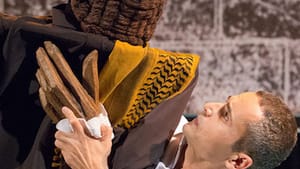Stay in the Loop
BSR publishes on a weekly schedule, with an email newsletter every Wednesday and Thursday morning. There’s no paywall, and subscribing is always free.
Something missing in between
Walnut Street Theatre Studio 3 presents Ibrahim Miari's 'In Between'

Ibrahim Miari's "semi-autobiographical" one-man drama In Between raises issues about the neverending struggle between Jews and Arabs, Israelis and Palestinians. In the intimate Walnut Street Theatre Independence Studio on 3, the writer-performer, son of a Jewish mother and Arab father, uses the framing device of a demeaning airport search to launch his life story.
Miari, a likable actor seen in the Walnut's The Humans last season, avoids discussing large political and social questions. Born Avraham, he attended a Jewish school until age seven; then his parents — for unexplained reasons — changed his name to the Arabic "Ibrahim" after his mother converted to Islam. They also enrolled him in Arabic school.
An affecting moment occurs when he sees his former Jewish pals in an Israeli Independence Day parade. Arabs call it "The Day of the Catastrophe," and Miari is too young and innocent to appreciate the distance between them.
Walls don't solve problems
Director Elena Araoz stages In Between on Roman Tatarowicz's simple, handsome set of three walls, made of posts suggesting bars. Three screens showing stone walls glow with different colors in Alyssandra Docherty's lighting.
Much of In Between focuses on Miari's marriage to Sarah, a Jewish woman from California. "Who would marry you?" the Israeli security agent, played with perfect passive-aggressive intensity by Miari, sneers while searching his suitcase. We never find out, because we barely meet her.
The wedding becomes Miari's focus. He employs a larger-than-life puppet to play rabbi, imam, and Buddhist priest (changing hat and scarf for each) in his quest to find someone to perform a mixed-religion ceremony.
Miari's portrayal of his fiancée’s mother, who struggles within the bounds of American political correctness to reconcile Miari's Arab identity by emphasizing his Jewish roots, is both funny and frightening.
He shows his own father reacting more directly: "Aren't there enough Arab girls?" When Miari notes that his father married a Jewish woman, he responds, "Your mother was different." Alas, all we know of their story is Miari's fantasy about how they met.
Dancing around the issues
Miari deftly plays all the roles in his story, using only subtle voice and inflection changes rather than costumes to distinguish each. The scenes reveal problems but do not dramatize solutions.
Presumably, Miari marries despite family and clergy objections. Though he's a "demographic problem" as an "inside Arab" — an Arab citizen of Israel — these challenges are overcome by the 80-minute show's end, but we don't see how or why.
Even the security guard in Miari's harrowing interrogation scenes, his quiet menace heightened through suspenseful underscoring by sound designer Nathan Leigh, eventually allows Miari to proceed without explanation.
Miari performs the Sufi dance's meditative spinning several times, implying that we can overcome insurmountable problems by spiritually rising above them. Or maybe I'm just reaching for an explanation connecting Miari's difficulties with his happy ending, trying to find the in-between that's missing in In Between.
What, When, Where
In Between. By Ibrahim Miari, Elena Araoz directed. Through October 28, 2018, at the Walnut Street Theatre’s Independence Studio on 3, 825 Walnut Street, Philadelphia. (215) 574-3550 or walnutstreettheatre.org.
Sign up for our newsletter
All of the week's new articles, all in one place. Sign up for the free weekly BSR newsletters, and don't miss a conversation.

 Mark Cofta
Mark Cofta